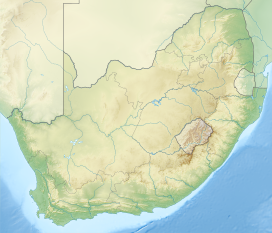Ubombo Mountains
| Lebombo Mountains (Lubombo / Libombos) | |
|---|---|

Part of the Lebombo mountain chain, including Ghost Mountain; seen from Mkuze
|
|
| Highest point | |
| Peak | Mount Mananga |
| Elevation | 776 m (2,546 ft) |
| Listing | List of mountain ranges of South Africa |
| Coordinates | 26°15′0″S 32°0′0″E / 26.25000°S 32.00000°ECoordinates: 26°15′0″S 32°0′0″E / 26.25000°S 32.00000°E |
| Dimensions | |
| Length | 800 km (500 mi) N/S |
| Width | 100 km (62 mi) E/W |
| Geography | |
| Countries | Mozambique, South Africa and Swaziland |
| Geology | |
| Orogeny | Gondwanian |
| Age of rock | Precambrian |
| Type of rock | Rhyolite and basalt |
The Lebombo Mountains, also called Lubombo Mountains (Portuguese: Montes Libombos), are an 800 km long, narrow range of mountains in Southern Africa. They stretch from Hluhluwe in KwaZulu-Natal in the south to Punda Maria in the Limpopo Province in South Africa in the north. Part of the mountains are also found in Mozambique and Swaziland.
Geologically, the range is considered a monocline; part of a rifted volcanic margin. The Lebombo monocline was aligned with the Explora Escarpment off-shore Dronning Maud Land, Antarctica, before the break-up of Gondwana. The Lebombo monocline strikes N-S and dips to the east. It is composed of a sequence of Jurassic age volcanic rock, both basaltic lavas and rhyolitic flows and tuffs. The sequence rests on essentially horizontal Karoo Supergroup sedimentary rocks of the Kalahari Craton to the west and is overlain by Cretaceous to recent sediments to the east. The alternating resistant rhyolite and easily eroded basalts produce a series of parallel sharp cuesta ridges separated by savanna plains.
...
Wikipedia

